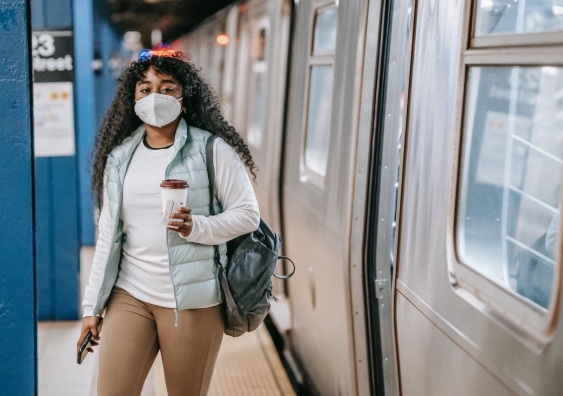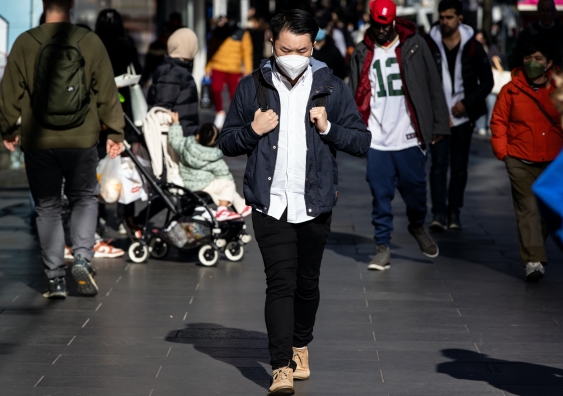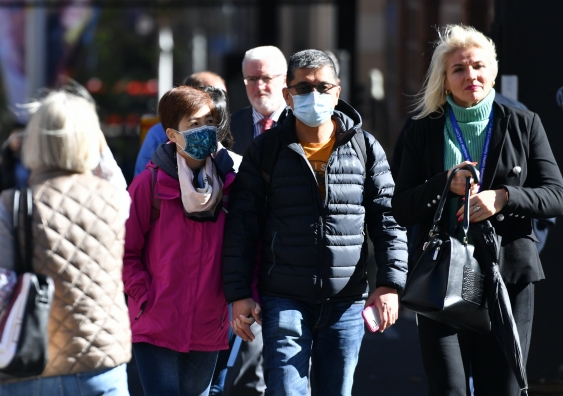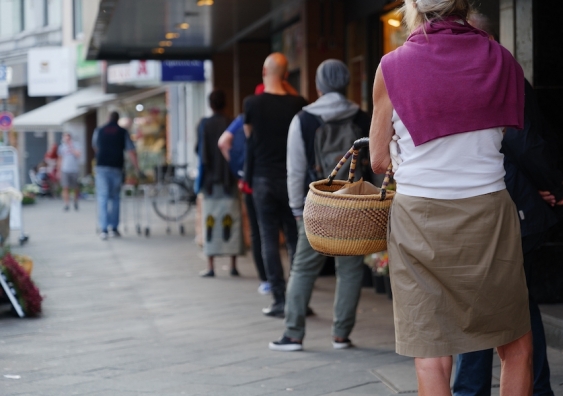The airborne nature of COVID supports routine use of respirators by the public. Here, experts explain the science behind this recommendation.
With the rapid spread of Omicron, many countries are rethinking their COVID mask advice for the community.
Respirators have been mandatory in public places in Austria for a year. Now, the suggests respirators be considered for greater protection, for instance, on public transport or in enclosed crowded spaces. It’s time to rethink and upgrade masks for you and your family.
What is a respirator?
Respirators, often wrongly called “masks” because of their appearance, are personal protective equipment made to a particular standard and designed to prevent inhalation of hazardous airborne contaminants.
In the US, respirator standards are managed by the (NIOSH), and cover three things: filter efficiency, breathing resistance and fit. A filter that meets the N95 standard (equivalent to Europe’s FFP2) must capture at least 95% of particles in the most penetrating size range at a high flow rate. In Australia, a respirator must meet .
A respirator that consists entirely of filtering material – rather than having layers, say for waterproofing – is called a filtering facepiece respirator (FFR). An FFR can be worn multiple times but must eventually be thrown away. Research suggests FFRs lose their ability to fit well after – due to stretching of straps or failure of the nose clip or edge components.
The filter material is usually a non-woven polypropylene electret, which means the fibres carry an electrical charge to enhance particle collection while ensuring low breathing resistance.
Why were we told to wear cloth masks at first?
It was initially assumed SARS-CoV-2 spread via droplets (in coughs and sneezes) which caused infection when they landed on the mouth, nose or eyes. For such particles, a cloth or surgical mask is an efficient form of source control to protect others from virus emitted by the wearer.
Now it’s understood the virus is . Virus-laden particles build up in the air over time indoors because of breathing and speaking.
Will a respirator protect me even if others are unmasked?
It depends on the type of exposure and how long you are exposed. It is important to consider your risk depending on .
�ճ����, especially for prolonged contact in crowded settings, is when everyone is wearing well-fitting N95 respirators.
It’s hard to show evidence to support respirator use in the community – but lack of randomised controlled trials (RCT) does not mean they are not effective. Studying masks or respirators at a population level is complex and involves many variables. There is from RCTs in health workers and laboratory studies showing respirators are effective for source control and personal protection.
I really like my cloth mask. Is it OK to keep wearing it?
Probably not. Cloth masks are not made to any particular standard, so their properties and quality vary considerably.
In general, they are poor filters of small airborne particles.
Why were we told to wear cloth masks at first?
It was initially assumed SARS-CoV-2 spread via droplets (in coughs and sneezes) which caused infection when they landed on the mouth, nose or eyes. For such particles, a cloth or surgical mask is an efficient form of source control to protect others from virus emitted by the wearer.
Now it’s understood the virus is . Virus-laden particles build up in the air over time indoors because of breathing and speaking.
Will a respirator protect me even if others are unmasked?
It depends on the type of exposure and how long you are exposed. It is important to consider your risk depending on .
�ճ����, especially for prolonged contact in crowded settings, is when everyone is wearing well-fitting N95 respirators.
It’s hard to show evidence to support respirator use in the community – but lack of randomised controlled trials (RCT) does not mean they are not effective. Studying masks or respirators at a population level is complex and involves many variables. There is from RCTs in health workers and laboratory studies showing respirators are effective for source control and personal protection.
I really like my cloth mask. Is it OK to keep wearing it?
Probably not. Cloth masks are not made to any particular standard, so their properties and quality vary considerably.
In general, they are poor filters of small airborne particles.
Surgical masks are cheaper – can I just switch to those?
Not really. While some surgical masks may have better filtration capacity than cloth masks, they were designed primarily to prevent the emission of large droplets. Some medical-grade surgical masks may also offer protection from body fluid splashes or sprays. No surgical mask will prevent the emission or inhalation of small infectious particles, however.
A key deficiency of surgical and cloth masks is their loose fit compared to respirators.
While some older, hard-cup style respirators may be uncomfortable, newer styles are . This may be due to their greater surface area, which could contribute to lower breathing resistance.
Should I have my respirator professionally fitted?
No. When respirators are used to protect workers from airborne hazards such as dust or pollution, employers are legally required to undertake fit-testing (see for example the US fit-testing standard). But even non-fit tested respirators will provide over cloth or surgical masks.
A respirator should rest against your face with no gaps, especially around the nose and chin. To create a tight seal, form the nose clip and place both straps around your head, adjusting them if necessary.
If the facepiece collapses a small amount when you inhale, the respirator probably fits well. Get in the habit of doing a before each wear.
Shouldn’t respirators be reserved for healthcare professionals?
No. Early in the pandemic, the public were discouraged from buying respirators because of a global shortage of personal protective equipment and the assumption healthcare workers were at higher risk of catching COVID from so-called “aerosol-generating procedures” such as intubation.
We now know are more likely to generate infectious aerosols than medical procedures.
As with vaccines, there are global equity issues and we need to to ensure sufficient supply for everyone.
What about the cost and environmental impact?
Compared to cloth masks, respirators (which are not washable) cost more and have a greater environmental impact. But disposable respirators can be used for extended periods if they are not wet or damaged, and there are re-usable options such as elastomeric respirators. A respirator should be thrown away when it gets dirty or the straps, nose clip or other components lose their integrity.
Costs and environmental concerns need to be weighed against the costs and waste produced by a single COVID hospital admission. In Australia, the average daily cost of an Intensive Care Unit stay has been .
What if I can’t afford or get my hands on a N95 respirator?
The Korean KF94 and Chinese KN95s are cheaper alternatives that provide better protection than a surgical or cloth mask. , such as those without a GN stamp to show they meet manufacturing standards.
If you can’t get hold of a respirator, you can improve protection of a surgical or cloth mask.
Options include “” by wearing a tight-fitting cloth mask over a surgical mask. You can also “knot and tuck” a surgical mask by tying the sides and tucking the remainder inside. Finally, a well-designed cloth mask (with three layers) can perform as well as a good quality surgical mask.
It’s still true that something is better than nothing. But don’t count on these types of masks to provide the same level of protection for the same amount of time as an N95 respirator.
Respirators should be provided and required
The World Health Organization has stressed the importance of a “vaccines-plus” approach.
There is a strong case, when prevalence of COVID is high, for governments to both mandate and fund the provision of respirators for the public, are now doing.
![]()
, PhD candidate and infectious diseases doctor, ;��, Professor of Global Biosecurity, NHMRC Principal Research Fellow, Head, Biosecurity Program, Kirby Institute, ;��, Research Consultant, Center for Infectious Disease Research and Policy, , and , Professor of Primary Care Health Sciences,
This article is republished from under a Creative Commons license. Read the .
Related stories
-

Yes, masks reduce the risk of spreading COVID, despite a review saying they don’t
-

Cutting COVID isolation and mask mandates will mean more damage to business and health in the long run
-

Mask mandates – will we only act on public health advice if someone makes us?
-

COVID mask mandates might be largely gone but here are 5 reasons to keep wearing yours





